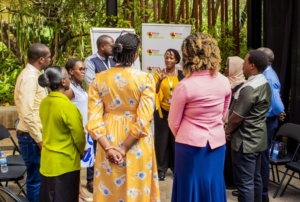Scoring a hat trick for the environment – Wasafiri’s own efforts to tackle the climate crisis

Latest posts
Share:
How can we go the extra mile as a business to do our part in the climate emergency?
In 2019, Wasafiri acknowledged the climate emergency and committed to reducing our carbon footprint. Every year we will calculate and offset our CO2; we do this with our carbon-balancing partner C-Level.
As an active participant working to create systemic change for Climate & Nature, we had to go further than offsetting. Luckily, C-Level being a pioneer in ‘net-zero by nature’, had the answer we were searching for; a chance to double and triple down on our contributions, or what I call, “The Hat Trick”.
Goal #1 – Carbon balancing rather than the limited ‘carbon neutral’ and ‘offsetting’
Carbon Balanced is a term C-Level coined and a certification they provide that offsets through natural climate solutions and is based on 3 core values:
- Action on carbon
- Action on forests
- Working with communities
“As a term and a process, Carbon Balanced is larger than offsetting. Offsetting is a limited term that only addresses carbon emissions. While we work with verified carbon offsets, we always work with nature and people as well. So, Carbon Balanced is also about connecting people in business to the power of nature and local communities”, says C-Level.
Since a lot of our work is in East Africa, we chose the Hadza Hunter Gatherers, Tanzania for our 2020 carbon balancing project. Supporting livelihoods and strengthening land rights is one of the most effective and underused solutions to reducing deforestation. Working with the Hadza (one of Africa’s last tribes of hunter-gatherers), our partners Carbon Tanzania are reducing deforestation over some 32,000 hectares of forest in the Yaeda Valley.
This project is designed with the full involvement of the Hadza community, and they receive payments and livelihood benefits as money flows to them from the sale of holistic carbon credits. Capturing carbon through ecosystems which works for carbon balanced certification and for Net Zero emerging best practice.
C-Level Carbon Balanced projects are all verified under the global Plan Vivo Standard.
Goal #2 – Double down by compensating for 200% of your carbon footprint
Simply put, we need to contribute twice as much as we produce. We are happy to say that this will result in 216 trees planted through the Hadza community.
Goal #3 – Triple down with a contribution to C Level’s Wild Aligned program
“To change culture, not climate, we need to re-wild our people and our business systems.” Their Wild Aligned program gives the chance for communities and businesses to get involved in early-stage ecological and cultural regen and rewilding projects that have a metric of trees grown rather than verified carbon.
Deeper engagement and experience are key to this program that aims to have clients and communities participate in the projects and take part in experiential events. Wasafiri mirrored our 2020 carbon balancing budget for this initiative in three European locations resulting in 66 trees to be planted.

Thanks to C Level for their innovation and dedication to the climate and nature movement for over 20 years. They truly live Wasafiri’s motto, “Together, we can tackle humanity’s toughest problems”.










